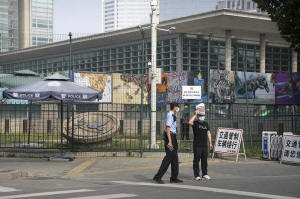US bans government personnel in China from romantic or sexual relations
with Chinese citizens
[April 03, 2025]
By DAKE KANG, MATTHEW LEE and DIDI TANG
WASHINGTON (AP) — The U.S. government has banned American government
personnel in China, as well as family members and contractors with
security clearances, from any romantic or sexual relationships with
Chinese citizens, The Associated Press has learned.
Four people with direct knowledge of the matter told the AP about the
policy, which was put into effect by departing U.S. Ambassador Nicholas
Burns in January shortly before he left China. The people would speak
only on condition of anonymity to discuss details of a confidential new
directive.
Though some U.S. agencies already had strict rules on such
relationships, a blanket “non-fraternization” policy, as it is known,
has been unheard of publicly since the Cold War. It’s not uncommon for
American diplomats in other countries to date locals and even marry
them.
A more limited version of the policy was enacted last summer prohibiting
U.S. personnel from “romantic and sexual relations” with Chinese
citizens working as guards and other support staff at the U.S. Embassy
and five consulates in China. But Burns, the departing ambassador,
broadened it to a blanket ban on such relations with any Chinese citizen
in China in January, days before President Donald Trump took office. The
AP was unable to determine exactly how the policy defined the phrase
“romantic or sexual relationship."

Two of the people with knowledge of the ban told the AP the new policy
was first discussed last summer after members of Congress contacted
Burns to express concern that restrictions on such relationships were
not stringent enough. The House Select Committee on the Chinese
Communist Party did not respond to a request for comment.
The new policy covers U.S. missions in mainland China, including the
embassy in Beijing and consulates in Guangzhou, Shanghai, Shenyang and
Wuhan, as well as the American consulate in the semi-autonomous
territory of Hong Kong. It does not apply to U.S. personnel stationed
outside China.
The only exception to the policy is U.S. personnel with pre-existing
relations with Chinese citizens; they can apply for exemptions. If the
exemption is denied, they must end the relationship or leave their
position, the people said. Anyone who violates the policy will be
ordered to leave China immediately.
The policy was communicated verbally and electronically to American
personnel in China in January, but has not been publicly announced.
The State Department said it does not comment on internal matters. The
National Security Council referred questions to the State Department.
Burns, the former ambassador, did not reply to an AP request sent to his
email address at The Cohen Group, a consultancy that he rejoined as vice
chair in February.
A Cold War throwback
Intelligence services across the world have long used attractive men and
women to obtain sensitive information, famously during the Cold War. The
State Department and other agencies with offices in China have long had
stringent reporting requirements on personal relationships for American
personnel stationed there, as well as rivals considered high
intelligence threats such as Russia or Cuba.
Declassified State Department documents show that in 1987, the U.S.
government barred personnel stationed in the Soviet bloc and China from
befriending, dating or having sex with locals after a U.S. Marine in
Moscow was seduced by a Soviet spy. Such restrictions were relaxed after
the collapse of the Soviet Union in 1991, according to news reports at
the time.

[to top of second column]
|

Uniformed and plainclothes security officers stand guard outside the
U.S. Embassy in Beijing, Aug. 3, 2022. (AP Photo/Mark Schiefelbein,
File)

In China, a blanket ban on such relations has not been in effect for
many years. Until the new ban in January, U.S. personnel in China
were required to report any intimate contact with Chinese citizens
to their supervisors, but were not explicitly forbidden from sexual
or romantic relationships.
U.S. diplomats and intelligence experts say that Beijing continues
to aggressively use so-called honeypots to access American secrets.
In presentations before being stationed in China, U.S. personnel are
briefed on case studies where Chinese intelligence services sent
attractive women to seduce American diplomats, and warned that
dozens of Chinese state security agents can be assigned to monitor
any individual diplomat of interest.
Little is known about the U.S. government’s non-fraternization
policies elsewhere, as they are considered classified. It is unknown
how restrictive such policies are in other countries.
Rising tensions, tighter controls
In recent years, tensions between Washington and Beijing have
escalated over trade, technology and geopolitical competition.
Peter Mattis, a former CIA analyst and president of The Jamestown
Foundation, a Washington-based think tank, said there were at least
two publicized cases in which Chinese agents seduced American
diplomats stationed in China, though he hasn’t heard of such a case
in recent years.
Mattis added that another issue is that Chinese state security
doesn’t gather intelligence just through spies, but also by pressing
ordinary Chinese people for information, often through threats or
intimidation. That, Mattis said, means any Chinese citizen who dates
an American diplomat could be vulnerable to coercion.
“The MSS is willing to leverage any human connection that a target
has to collect intelligence,” Mattis said, using an acronym
referring to China’s Ministry of State Security. “This rule change
suggests the MSS has gotten a lot more aggressive at trying to
access the embassy and U.S. government.”

The Chinese foreign ministry did not comment on the ban, saying in a
faxed statement that it was “more appropriate to ask the U.S. about
this question.”
China also has been tightening already strict controls on its
personnel overseas, according to Chinese regulations, news reports
and four people familiar with China’s bureaucracy who spoke on
condition of anonymity so they could discuss a sensitive topic. In
recent years, Beijing began strictly enforcing regulations that bar
promotions for Chinese civil servants with spouses who acquired
foreign citizenship and restrict diplomats from spending an extended
period of time in one country, forcing some to return to China.
China’s foreign ministry and many other government bodies bar their
officials and staff from sexual or romantic relations with foreign
citizens, while members of the Chinese military or police are
generally barred from leaving China altogether without express
approval from their supervisors.
___
Kang reported from Beijing.
All contents © copyright 2025 Associated Press. All rights reserved |